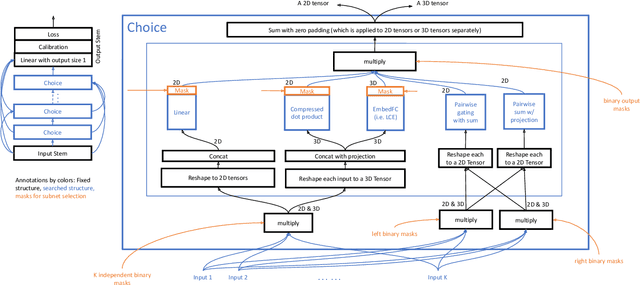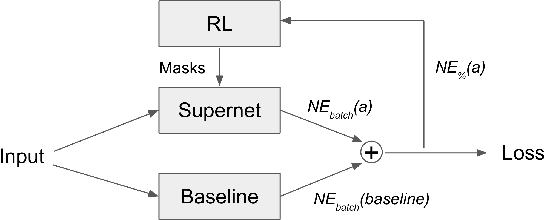Lin Jiang
HealthMamba: An Uncertainty-aware Spatiotemporal Graph State Space Model for Effective and Reliable Healthcare Facility Visit Prediction
Feb 05, 2026Abstract:Healthcare facility visit prediction is essential for optimizing healthcare resource allocation and informing public health policy. Despite advanced machine learning methods being employed for better prediction performance, existing works usually formulate this task as a time-series forecasting problem without considering the intrinsic spatial dependencies of different types of healthcare facilities, and they also fail to provide reliable predictions under abnormal situations such as public emergencies. To advance existing research, we propose HealthMamba, an uncertainty-aware spatiotemporal framework for accurate and reliable healthcare facility visit prediction. HealthMamba comprises three key components: (i) a Unified Spatiotemporal Context Encoder that fuses heterogeneous static and dynamic information, (ii) a novel Graph State Space Model called GraphMamba for hierarchical spatiotemporal modeling, and (iii) a comprehensive uncertainty quantification module integrating three uncertainty quantification mechanisms for reliable prediction. We evaluate HealthMamba on four large-scale real-world datasets from California, New York, Texas, and Florida. Results show HealthMamba achieves around 6.0% improvement in prediction accuracy and 3.5% improvement in uncertainty quantification over state-of-the-art baselines.
GeoGen: A Two-stage Coarse-to-Fine Framework for Fine-grained Synthetic Location-based Social Network Trajectory Generation
Oct 09, 2025



Abstract:Location-Based Social Network (LBSN) check-in trajectory data are important for many practical applications, like POI recommendation, advertising, and pandemic intervention. However, the high collection costs and ever-increasing privacy concerns prevent us from accessing large-scale LBSN trajectory data. The recent advances in synthetic data generation provide us with a new opportunity to achieve this, which utilizes generative AI to generate synthetic data that preserves the characteristics of real data while ensuring privacy protection. However, generating synthetic LBSN check-in trajectories remains challenging due to their spatially discrete, temporally irregular nature and the complex spatio-temporal patterns caused by sparse activities and uncertain human mobility. To address this challenge, we propose GeoGen, a two-stage coarse-to-fine framework for large-scale LBSN check-in trajectory generation. In the first stage, we reconstruct spatially continuous, temporally regular latent movement sequences from the original LBSN check-in trajectories and then design a Sparsity-aware Spatio-temporal Diffusion model (S$^2$TDiff) with an efficient denosing network to learn their underlying behavioral patterns. In the second stage, we design Coarse2FineNet, a Transformer-based Seq2Seq architecture equipped with a dynamic context fusion mechanism in the encoder and a multi-task hybrid-head decoder, which generates fine-grained LBSN trajectories based on coarse-grained latent movement sequences by modeling semantic relevance and behavioral uncertainty. Extensive experiments on four real-world datasets show that GeoGen excels state-of-the-art models for both fidelity and utility evaluation, e.g., it increases over 69% and 55% in distance and radius metrics on the FS-TKY dataset.
UQGNN: Uncertainty Quantification of Graph Neural Networks for Multivariate Spatiotemporal Prediction
Aug 12, 2025



Abstract:Spatiotemporal prediction plays a critical role in numerous real-world applications such as urban planning, transportation optimization, disaster response, and pandemic control. In recent years, researchers have made significant progress by developing advanced deep learning models for spatiotemporal prediction. However, most existing models are deterministic, i.e., predicting only the expected mean values without quantifying uncertainty, leading to potentially unreliable and inaccurate outcomes. While recent studies have introduced probabilistic models to quantify uncertainty, they typically focus on a single phenomenon (e.g., taxi, bike, crime, or traffic crashes), thereby neglecting the inherent correlations among heterogeneous urban phenomena. To address the research gap, we propose a novel Graph Neural Network with Uncertainty Quantification, termed UQGNN for multivariate spatiotemporal prediction. UQGNN introduces two key innovations: (i) an Interaction-aware Spatiotemporal Embedding Module that integrates a multivariate diffusion graph convolutional network and an interaction-aware temporal convolutional network to effectively capture complex spatial and temporal interaction patterns, and (ii) a multivariate probabilistic prediction module designed to estimate both expected mean values and associated uncertainties. Extensive experiments on four real-world multivariate spatiotemporal datasets from Shenzhen, New York City, and Chicago demonstrate that UQGNN consistently outperforms state-of-the-art baselines in both prediction accuracy and uncertainty quantification. For example, on the Shenzhen dataset, UQGNN achieves a 5% improvement in both prediction accuracy and uncertainty quantification.
Uncertainty-aware Predict-Then-Optimize Framework for Equitable Post-Disaster Power Restoration
Aug 06, 2025Abstract:The increasing frequency of extreme weather events, such as hurricanes, highlights the urgent need for efficient and equitable power system restoration. Many electricity providers make restoration decisions primarily based on the volume of power restoration requests from each region. However, our data-driven analysis reveals significant disparities in request submission volume, as disadvantaged communities tend to submit fewer restoration requests. This disparity makes the current restoration solution inequitable, leaving these communities vulnerable to extended power outages. To address this, we aim to propose an equity-aware power restoration strategy that balances both restoration efficiency and equity across communities. However, achieving this goal is challenging for two reasons: the difficulty of predicting repair durations under dataset heteroscedasticity, and the tendency of reinforcement learning agents to favor low-uncertainty actions, which potentially undermine equity. To overcome these challenges, we design a predict-then-optimize framework called EPOPR with two key components: (1) Equity-Conformalized Quantile Regression for uncertainty-aware repair duration prediction, and (2) Spatial-Temporal Attentional RL that adapts to varying uncertainty levels across regions for equitable decision-making. Experimental results show that our EPOPR effectively reduces the average power outage duration by 3.60% and decreases inequity between different communities by 14.19% compared to state-of-the-art baselines.
HCRide: Harmonizing Passenger Fairness and Driver Preference for Human-Centered Ride-Hailing
Aug 06, 2025Abstract:Order dispatch systems play a vital role in ride-hailing services, which directly influence operator revenue, driver profit, and passenger experience. Most existing work focuses on improving system efficiency in terms of operator revenue, which may cause a bad experience for both passengers and drivers. Hence, in this work, we aim to design a human-centered ride-hailing system by considering both passenger fairness and driver preference without compromising the overall system efficiency. However, it is nontrivial to achieve this target due to the potential conflicts between passenger fairness and driver preference since optimizing one may sacrifice the other. To address this challenge, we design HCRide, a Human-Centered Ride-hailing system based on a novel multi-agent reinforcement learning algorithm called Harmonization-oriented Actor-Bi-Critic (Habic), which includes three major components (i.e., a multi-agent competition mechanism, a dynamic Actor network, and a Bi-Critic network) to optimize system efficiency and passenger fairness with driver preference consideration. We extensively evaluate our HCRide using two real-world ride-hailing datasets from Shenzhen and New York City. Experimental results show our HCRide effectively improves system efficiency by 2.02%, fairness by 5.39%, and driver preference by 10.21% compared to state-of-the-art baselines.
Lightweight Contrastive Distilled Hashing for Online Cross-modal Retrieval
Feb 28, 2025Abstract:Deep online cross-modal hashing has gained much attention from researchers recently, as its promising applications with low storage requirement, fast retrieval efficiency and cross modality adaptive, etc. However, there still exists some technical hurdles that hinder its applications, e.g., 1) how to extract the coexistent semantic relevance of cross-modal data, 2) how to achieve competitive performance when handling the real time data streams, 3) how to transfer the knowledge learned from offline to online training in a lightweight manner. To address these problems, this paper proposes a lightweight contrastive distilled hashing (LCDH) for cross-modal retrieval, by innovatively bridging the offline and online cross-modal hashing by similarity matrix approximation in a knowledge distillation framework. Specifically, in the teacher network, LCDH first extracts the cross-modal features by the contrastive language-image pre-training (CLIP), which are further fed into an attention module for representation enhancement after feature fusion. Then, the output of the attention module is fed into a FC layer to obtain hash codes for aligning the sizes of similarity matrices for online and offline training. In the student network, LCDH extracts the visual and textual features by lightweight models, and then the features are fed into a FC layer to generate binary codes. Finally, by approximating the similarity matrices, the performance of online hashing in the lightweight student network can be enhanced by the supervision of coexistent semantic relevance that is distilled from the teacher network. Experimental results on three widely used datasets demonstrate that LCDH outperforms some state-of-the-art methods.
Rankitect: Ranking Architecture Search Battling World-class Engineers at Meta Scale
Nov 14, 2023



Abstract:Neural Architecture Search (NAS) has demonstrated its efficacy in computer vision and potential for ranking systems. However, prior work focused on academic problems, which are evaluated at small scale under well-controlled fixed baselines. In industry system, such as ranking system in Meta, it is unclear whether NAS algorithms from the literature can outperform production baselines because of: (1) scale - Meta ranking systems serve billions of users, (2) strong baselines - the baselines are production models optimized by hundreds to thousands of world-class engineers for years since the rise of deep learning, (3) dynamic baselines - engineers may have established new and stronger baselines during NAS search, and (4) efficiency - the search pipeline must yield results quickly in alignment with the productionization life cycle. In this paper, we present Rankitect, a NAS software framework for ranking systems at Meta. Rankitect seeks to build brand new architectures by composing low level building blocks from scratch. Rankitect implements and improves state-of-the-art (SOTA) NAS methods for comprehensive and fair comparison under the same search space, including sampling-based NAS, one-shot NAS, and Differentiable NAS (DNAS). We evaluate Rankitect by comparing to multiple production ranking models at Meta. We find that Rankitect can discover new models from scratch achieving competitive tradeoff between Normalized Entropy loss and FLOPs. When utilizing search space designed by engineers, Rankitect can generate better models than engineers, achieving positive offline evaluation and online A/B test at Meta scale.
Sudowoodo: a Chinese Lyric Imitation System with Source Lyrics
Aug 09, 2023Abstract:Lyrics generation is a well-known application in natural language generation research, with several previous studies focusing on generating accurate lyrics using precise control such as keywords, rhymes, etc. However, lyrics imitation, which involves writing new lyrics by imitating the style and content of the source lyrics, remains a challenging task due to the lack of a parallel corpus. In this paper, we introduce \textbf{\textit{Sudowoodo}}, a Chinese lyrics imitation system that can generate new lyrics based on the text of source lyrics. To address the issue of lacking a parallel training corpus for lyrics imitation, we propose a novel framework to construct a parallel corpus based on a keyword-based lyrics model from source lyrics. Then the pairs \textit{(new lyrics, source lyrics)} are used to train the lyrics imitation model. During the inference process, we utilize a post-processing module to filter and rank the generated lyrics, selecting the highest-quality ones. We incorporated audio information and aligned the lyrics with the audio to form the songs as a bonus. The human evaluation results show that our framework can perform better lyric imitation. Meanwhile, the \textit{Sudowoodo} system and demo video of the system is available at \href{https://Sudowoodo.apps-hp.danlu.netease.com/}{Sudowoodo} and \href{https://youtu.be/u5BBT_j1L5M}{https://youtu.be/u5BBT\_j1L5M}.
Youling: an AI-Assisted Lyrics Creation System
Jan 18, 2022



Abstract:Recently, a variety of neural models have been proposed for lyrics generation. However, most previous work completes the generation process in a single pass with little human intervention. We believe that lyrics creation is a creative process with human intelligence centered. AI should play a role as an assistant in the lyrics creation process, where human interactions are crucial for high-quality creation. This paper demonstrates \textit{Youling}, an AI-assisted lyrics creation system, designed to collaborate with music creators. In the lyrics generation process, \textit{Youling} supports traditional one pass full-text generation mode as well as an interactive generation mode, which allows users to select the satisfactory sentences from generated candidates conditioned on preceding context. The system also provides a revision module which enables users to revise undesired sentences or words of lyrics repeatedly. Besides, \textit{Youling} allows users to use multifaceted attributes to control the content and format of generated lyrics. The demo video of the system is available at https://youtu.be/DFeNpHk0pm4.
 Add to Chrome
Add to Chrome Add to Firefox
Add to Firefox Add to Edge
Add to Edge